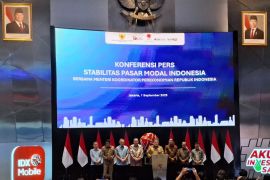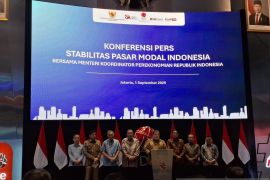Tony Prasetiantono from the State Gajahmada University in Yogyakarta said in view of this situation, Indonesia must expedite the implementation of downstream industrialization and export market expansion.
He said the projection that the Chinese economy would only grow 6.3 percent in 2016 and the negative impact of the yuans devaluation would have a strong effect on Indonesia.
"The exchange rate upheaval and decline in the Chinese economic growth would affect us much because China is our main trading partner," he said during a seminar organized by Bank Indonesia (BI).
Prasetiantono said external pressures, including from China were quite confusing because their impact was strong, while on the other hand the government could only act maximally using instruments directly controlled by the government, such as imposition of pro-investment policies, optimizing budget spending and consistently maintaining financial market stability.
He reminded that the yuans devaluation could stimulate Chinas exports and flood Indonesias domestic market with products from that country.
BIs North Sulawesi chapters Chief Peter Jacobs said on the occasion that other external pressures on the countrys economy had stemmed from a decline in the price of commodities that affected the regional economy very much.
In view of that he said regions needed to accelerate development of downstream industries to boost competitiveness for their export products.
With regards to North Sulawesi, he recommended developing processing activity for the regions coconut commodity.
He said if coconuts are processed into copra, their value will rise by 78 percent.
The other sector that should be prioritized in North Sulawesi is tourism, he added.
Besides its abundant tourism potential, such as the Bunaken sea park, North Sulawesi also needed to also develop other kinds of tourism destinations, he said.(*)
Editor: Heru Purwanto
Copyright © ANTARA 2015











